
| More Heads | The Body | From the Rear | Movement | Standards | Anatomy | Famous Sires | Photo Gallery | Links |
| Differences Around the World | Body Style Comparisions | Beautiful Heads | Eye Shape | The Skull Shape | Optical Illusions |
| How Structure affects Movement | Choosing a Puppy | Contact Me |
THE ANATOMY OF A BOXER
: TOPOGRAPHICAL ANATOMY : : SKELETAL ANATOMY : : MUSCULATION :Anatomy refers to the study of physical structure of animals. When we look at a dog, much of what we see is the result of the growth of the bones, muscles, joints, ligaments and tendons. The bones and muscles give the dog its general conformation or shape.
CLICK HERE FOR BOXER BODY STLE COMPARISONS
TOPOGRAPHICAL ANATOMY
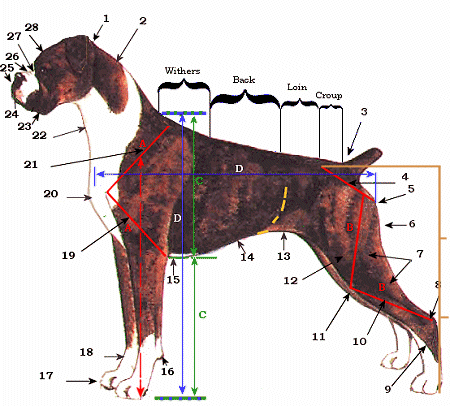 |
| 1 Nape of neck 2 Crest of neck 3 Tailset 4 Long Pelvis 5 Body behind the tail (protuberance) 6 Breech width- well developed 7 Well developed muscles 8 Hock 9 Rear pastern 10 Second (lower) thigh - broad 11 Bend of stifle 12 First (Upper) thigh - broad 13 End of ribcage - well ribbed back 14 Graceful curve of underline |
15 Lowest point of ribcage 16 Stopper pad 17 Cat feet 18 Slightly sloping pasterns 19 Upper Arm 20 Forechest or breastbone 21 Shoulderblade - 45 degrees 22 Clean (dry) neck 23 Flews 24 Chin -repandous 25 Top lip curves outwards from under nose 26 Muzzle 27 Stop 28 Top of skull - slightly arched |
|
Straight red lines represents the angulation of the dog. Red lines A represent the SHOULDER ANGULATION and should appear equal in length and the angle where they meet should be approx. 90 to 110 degrees. Red lines B represent the HIND ANGULATION and should appear equal in length and the angle where they meet should be approx. 90 to 110 degrees. This creates BALANCE Green lines C should be equal in length. Top of withers to brisket = brisket to ground. Blue lines D should be equal in length. Point of shoulder to point of buttock = top of wither to ground. The broken red line - If a line were drawn from the center of the shoulderblade perpendicular to the ground, it should end at the big pad of the front foot. This is the center of gravity for the front assembly. The broken yellow line - Ribage extending far to the rear giving a short loin area. Gold Line The height of the rear pastern is one third the height from the haunch bone to the ground. Withers - clearly defined Back - straight (not level) Loin - short Croup - slightly sloping |
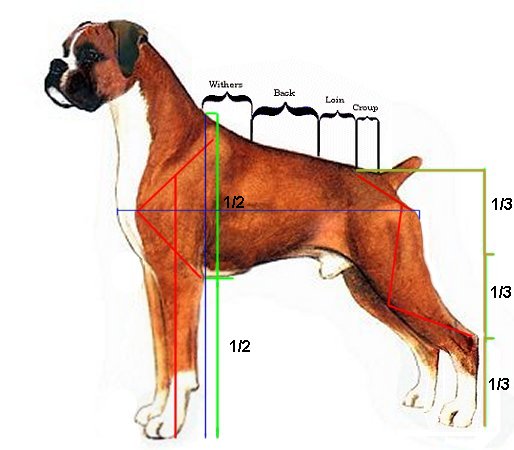
SKELETAL ANATOMY
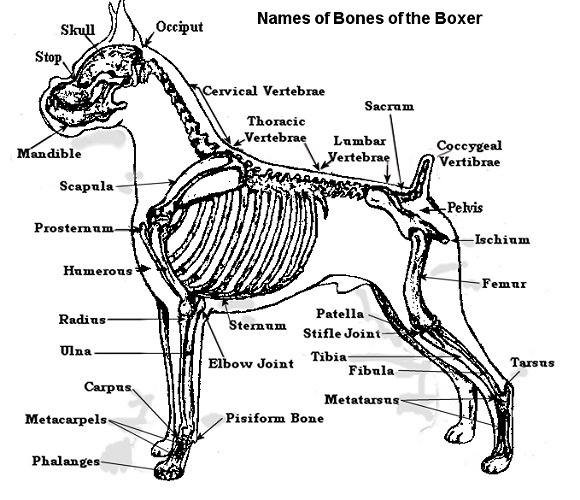
The Spinal Column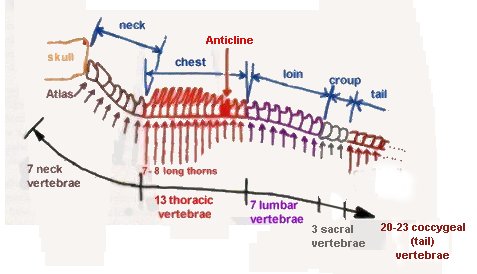
The Frontal View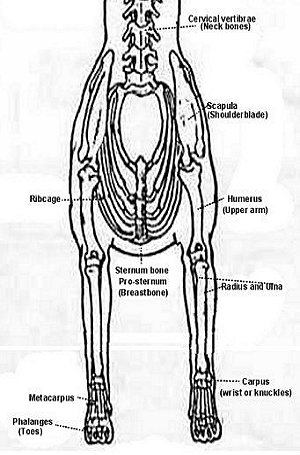 The Ribcage and ForechestThirteen pairs of ribs house the heart and lungs. The heart rests on the sternum bone between the third and eigth rib.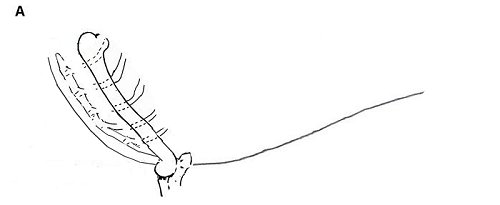 A - is the ideal ribcage shape for a Boxer. It has a gentle S curve to the rear which allows plenty of heart room and gives the desired fill between the front legs 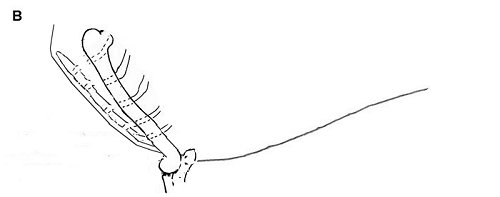 B - does not have the gently curve as the sternum cuts back abruptly and the dog has a slight "Pigeon Chest" 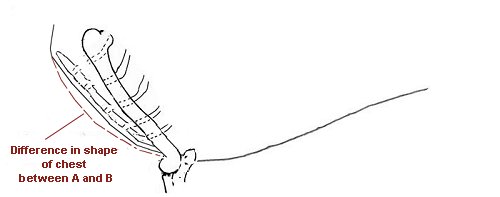 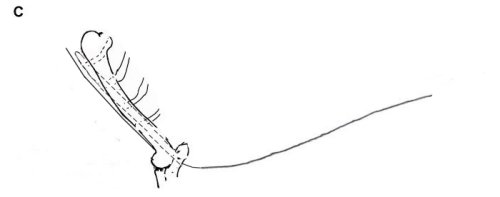 C - the sternum cuts back sharply limiting room for the heart and there is no fill between the front legs creating a "catherdral front " |
General Anatomy of a Dog in Detail
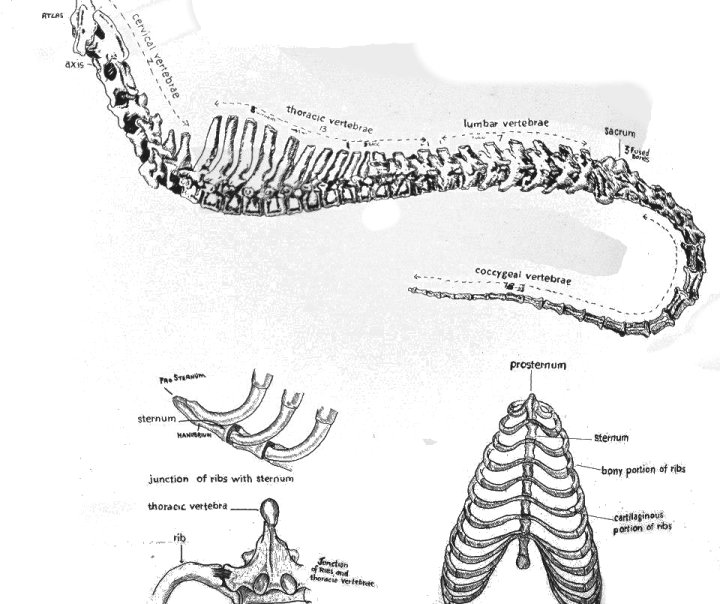
MUSCULAR ANATOMY

The primary function of muscles is to bring about movement to all or a part of the dog's body. There are three types of muscles:-
- Smooth - Smooth muscles are found within the internal organs such as the intestines, stomach, and bladder. These are not subject to voluntary or conscious control by the individual. They function automatically to satisfy the body's needs.
- Striated - Striated muscles are predominately attached to the skeleton. All of their movements are under the conscious control of the individual. They are involved with such things as walking, eating, tail wagging, eye movement, etc.
- Heart - is just what it sounds like. Heart muscle beats rhythmically on its own due to Pacemaker Cells in the Myocardium which discharge and cause the involuntary heartbeat as these fall under the category of involuntary muscles. The Myocardium is just the thickest middle layer of the heart wall and Pacemaker Cells are just cells that set and keep a pace within the heart synchronised properly.
| Home | Judging Type | History & Purpose | Temperament | Colour | The Side View | From the Front | The Head |
| More Heads | The Body | From the Rear | Movement | Standards | Anatomy | Famous Sires | Photo Gallery | Links |
| Differences Around the World | Body Style Comparisions | Beautiful Heads | Eye Shape | The Skull Shape | Optical Illusions |
| How Structure affects Movement | Choosing a Puppy | Contact Me |
| Tell a friend |
Copyright © Worldwide Boxer - All rights Reserved
Site design by Webpage World